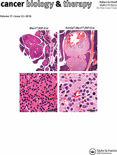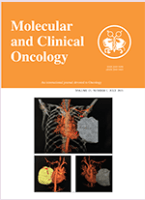
Cancer & Metabolism
Scope & Guideline
Illuminating Metabolic Pathways in Cancer Progression
Introduction
Aims and Scopes
- Metabolic Pathways in Cancer:
The journal focuses on elucidating the various metabolic pathways utilized by cancer cells, including glycolysis, oxidative phosphorylation, and lipid metabolism, to understand how these processes contribute to tumor growth and survival. - Tumor Microenvironment Interactions:
Research published in the journal often explores how the tumor microenvironment, including stromal and immune cell interactions, affects cancer metabolism and influences treatment responses. - Therapeutic Targeting of Metabolism:
A significant aim of the journal is to highlight studies that investigate metabolic vulnerabilities in cancer cells, identifying potential therapeutic targets that can be exploited for cancer treatment. - Metabolomics and Biomarkers:
The journal emphasizes the role of metabolomics in identifying biomarkers for cancer diagnosis, prognosis, and treatment response, contributing to personalized medicine approaches. - Preclinical and Clinical Studies:
'Cancer & Metabolism' publishes both preclinical and clinical research, bridging the gap between laboratory findings and their application in patient care.
Trending and Emerging
- Metabolic Reprogramming and Plasticity:
Recent publications emphasize the ability of cancer cells to adapt their metabolism in response to microenvironmental changes, which is crucial for understanding treatment resistance and tumor progression. - Role of Inflammation in Cancer Metabolism:
There is a growing interest in how systemic inflammation and the immune response affect cancer metabolism, highlighting the importance of these interactions in tumor biology and treatment outcomes. - Targeting Metabolic Checkpoints:
Research focusing on metabolic checkpoint inhibitors and their potential to enhance anti-tumor immunity is gaining traction, reflecting an innovative approach to cancer therapy. - Dietary Interventions and Cancer Metabolism:
Emerging studies are examining the impact of dietary patterns on cancer metabolism, suggesting that nutritional strategies may play a role in cancer prevention and management. - Integrative Omics Approaches:
The use of integrative omics (metabolomics, proteomics, genomics) to provide a comprehensive understanding of cancer metabolism and its complexities is increasingly prominent in recent publications.
Declining or Waning
- Basic Biochemical Pathways:
There appears to be a waning focus on fundamental biochemical pathways in cancer metabolism, as the field shifts towards more complex interactions within the tumor microenvironment and systemic metabolic changes. - Single Cancer Type Studies:
Research focusing exclusively on a single type of cancer without considering broader metabolic implications or cross-cancer comparisons has declined, as there is a growing trend towards integrative approaches that encompass multiple cancer types. - Static Metabolic Profiling:
Studies that provide static metabolic profiles without dynamic assessments or functional analyses are becoming less common, as the field increasingly values real-time and functional metabolic assessments. - Traditional Cancer Treatment Modalities:
There is a noticeable decrease in research centered on traditional chemotherapy and radiation alone, with a shift towards exploring combination therapies that target metabolic pathways alongside conventional treatments.
Similar Journals

Molecular Cancer
Exploring the forefront of molecular medicine and prevention.Molecular Cancer, published by BMC, stands as a premier open access journal dedicated to advancing our understanding of cancer biology, treatment, and prevention since its inception in 2002. With an impressive Q1 ranking in the domains of Cancer Research, Molecular Medicine, and Oncology, this journal occupies a significant position in the academic landscape, emphasizing high-quality research that influences clinical practices and future studies. The journal is indexed in leading databases with exceptional Scopus ranks, reflecting its rigorous peer-review process and impactful contributions to the field, where it ranks in the top 2-3 positions across various relevant categories. Based in the United Kingdom, Molecular Cancer offers researchers worldwide a valuable platform for disseminating innovative findings that drive the biomedical community forward. The journal's open access model ensures that groundbreaking research is freely accessible, fostering collaboration and knowledge sharing among professionals, students, and academics alike. Explore cutting-edge developments in cancer research through Molecular Cancer and join a community committed to improving patient outcomes and advancing scientific discovery.

EXPERT REVIEWS IN MOLECULAR MEDICINE
Exploring Innovations in Molecular Biology and MedicineEXPERT REVIEWS IN MOLECULAR MEDICINE, published by Cambridge University Press, stands at the forefront of research in the fields of Molecular Biology and Molecular Medicine. With an impressive impact factor reflecting its Q1 status in both relevant categories, this journal serves as an essential platform for disseminating cutting-edge reviews and critical assessments that are vital for advancing our understanding of molecular mechanisms in health and disease. Established in 1997 and continuously evolving until 2024, it features contributions from leading experts that highlight emerging trends and innovative methodologies. Researchers, professionals, and students are encouraged to engage with the content, benefiting from the journal’s rigorous peer-review process and its commitment to academic excellence, making it a valuable resource within the scientific community.

Genes & Diseases
Unlocking the secrets of genes to combat diseases.Genes & Diseases, published by KEAI PUBLISHING LTD, is a premier open-access journal dedicated to advancing the fields of genetics, biochemistry, and molecular biology. Established in 2014 and headquartered in Beijing, China, this journal has quickly risen to prominence, securing a place in the prestigious Q1 quartile in Biochemistry and Genetics (clinical), as well as Q2 in Cell Biology and Q1 in Molecular Biology as of 2023. With a commitment to disseminating cutting-edge research, Genes & Diseases serves as a critical platform for researchers, professionals, and students alike, ensuring that high-quality scientific work is openly accessible to the global community. The journal's exceptional impact is underscored by its selective Scopus rankings, which reflect its influence and relevance in key scientific domains, making it an essential resource for those exploring the intersections of genetics and disease pathology.

CANCER BIOLOGY & THERAPY
Innovating solutions for a cancer-free future.CANCER BIOLOGY & THERAPY is a premier open-access journal published by Taylor & Francis Inc, dedicated to advancing the field of cancer research and treatment. Since its inception in 2002, the journal has evolved to provide a platform for innovative research and groundbreaking findings, addressing critical aspects of cancer biology, pharmacology, and molecular medicine. With an impressive impact factor and recognition as a Q2 journal in vital categories such as Cancer Research, Oncology, and Pharmacology, it holds significant standing in Scopus rankings, reflecting its influence and commitment to disseminating high-quality research. Offering researchers, professionals, and students a wealth of knowledge, CANCER BIOLOGY & THERAPY stands at the forefront of the fight against cancer, presenting the latest developments and therapeutic strategies vital for improving patient outcomes. Accessible to all since 2022, this journal is a must-read for anyone involved in the multifaceted arena of cancer research and treatment.

Molecular and Clinical Oncology
Connecting researchers to revolutionize cancer treatment.Molecular and Clinical Oncology is a dynamic journal published by SPANDIDOS PUBL LTD, aimed at advancing the understanding of cancer biology and treatment modalities. With an ISSN of 2049-9450 and an E-ISSN of 2049-9469, the journal serves as a critical platform for researchers and clinicians dedicated to uncovering novel insights in molecular oncology and enhancing clinical practices. As a testament to its growing influence, the journal has achieved a Q3 ranking in Oncology and a Q4 ranking in Cancer Research for the year 2023, reflecting its commitment to publishing high-quality research. Although currently not an Open Access publication, the journal offers crucial subscription options, ensuring comprehensive access to groundbreaking studies and innovations in the field. With converged years spanning 2018 to 2024, the journal is set to continue enriching the academic community with its valuable contributions, ultimately empowering researchers, professionals, and students engaged in the fight against cancer.

Molecular Metabolism
Exploring the Interplay of Metabolism and HealthMolecular Metabolism is a premier, open-access journal published by Elsevier, dedicated to advancing the understanding of metabolic processes at the molecular level. With an ISSN of 2212-8778 and a proud presence in Germany, the journal has made significant contributions to the fields of Cell Biology and Molecular Biology, consistently achieving a Q1 ranking in both categories as of 2023. The journal’s scope encompasses cutting-edge research that explores metabolic pathways, their regulation, and implications for human health, underscoring the interplay between metabolism and various biological functions. Researchers and professionals benefit from the journal’s robust visibility, as it ranks #40 among 410 journals in Molecular Biology and #35 among 285 in Cell Biology according to Scopus metrics, placing it in the top 10 percentile in its field. With open access since 2012, Molecular Metabolism ensures that groundbreaking research is available to all, fostering a collaborative and inclusive academic environment. Its commitment to excellence and accessibility makes it an invaluable resource for those invested in metabolic research.

Frontiers in Bioscience-Landmark
Illuminating Pathways in Genetics and ImmunologyFrontiers in Bioscience-Landmark is a prestigious journal published by IMR PRESS that focuses on a diverse array of topics within the fields of biochemistry, genetics, molecular biology, immunology, and microbiology. With the ISSN 2768-6701 and E-ISSN 2768-6698, this journal has carved a significant niche since its inception in 1996, making its mark in contributions to the scientific community all the way through to 2024. Having achieved a respectable Q2 cohort rank in multiple categories, including biochemistry and immunology, it stands out for its impactful research, evidenced by its current Scopus rankings which highlight it as a vital resource for ongoing studies and advancements in the biosciences. Despite not being open access, the journal ensures that readers have access to high-quality research articles that are peer-reviewed and designed to foster academic discourse. The importance of Frontiers in Bioscience-Landmark lies in its commitment to disseminating innovative findings that can significantly enhance our understanding of biological sciences, making it an essential read for researchers, professionals, and students alike.

Cancer Communications
Transforming Cancer Research into Actionable KnowledgeCancer Communications, published by WILEY, is a leading open-access journal that has positioned itself at the forefront of cancer research and oncology since its inception in 2017. With an impressive HIndex reflective of its scholarly impact and recognized in the Q1 category for both Cancer Research and Oncology as of 2023, this journal consistently ranks in the top echelons of its field, specifically at Rank #16/404 and Rank #13/230 in their respective categories on Scopus. Cancer Communications aims to disseminate cutting-edge research findings, innovative methodologies, and significant advancements in cancer treatments, thereby fostering a deeper understanding of oncology among researchers, healthcare professionals, and students. The journal operates under an Open Access model since 2018, ensuring that vital research is accessible to a global audience, thus enhancing collaboration and knowledge sharing necessary to tackle one of the most pressing health challenges of our time. Located in Hoboken, NJ, United States, and with a strong commitment to scientific excellence, Cancer Communications remains an essential resource for anyone engaged in the fight against cancer.

Nature Metabolism
Illuminating the pathways of metabolism and biology.Nature Metabolism, published by NATURE PORTFOLIO, is a leading journal dedicated to advancing the field of metabolic research and its implications across various biological systems. Since its inception in 2019, this esteemed journal has rapidly established itself as a vital resource for researchers, professionals, and students alike, reflecting its prominence through a prestigious Q1 ranking in several key categories including Cell Biology, Endocrinology, Diabetes and Metabolism, Internal Medicine, and Physiology. With an impressive Scopus ranking, underscoring its impact in Medicine and Biochemistry disciplines, Nature Metabolism offers an exceptional platform for disseminating high-quality research that explores the intricate mechanisms of metabolism and its association with health and disease. Although currently not open access, it continues to gain visibility and appreciation within the scientific community, ensuring that groundbreaking findings reach interested audiences globally from its hub in Berlin, Germany. Whether you are an experienced researcher or an aspiring student, Nature Metabolism serves as an invaluable asset in navigating the complexities of metabolic science.

Annual Review of Cancer Biology
Charting New Directions in Cancer StudiesAnnual Review of Cancer Biology is a pivotal journal published by Annual Reviews, specializing in the rapidly evolving field of cancer research. With an impact factor positioned in the distinguished Q1 quartile of Cancer Research, Cell Biology, and Oncology categories, this journal ensures that it showcases the highest quality of scholarly contributions. Indexed in Scopus, it ranks among the top in its fields, reflecting its strong influence and relevance, with remarkable percentiles indicating its esteemed position within the research community. Although not an open-access journal, it provides a comprehensive platform for advancing the frontiers of cancer biology through rigorously curated reviews, highlighting key developments, breakthroughs, and future directions that inform both academia and clinical applications. As a valuable resource for researchers, professionals, and students, the Annual Review of Cancer Biology serves as an essential guide for understanding and addressing the complexities of cancer biology today.